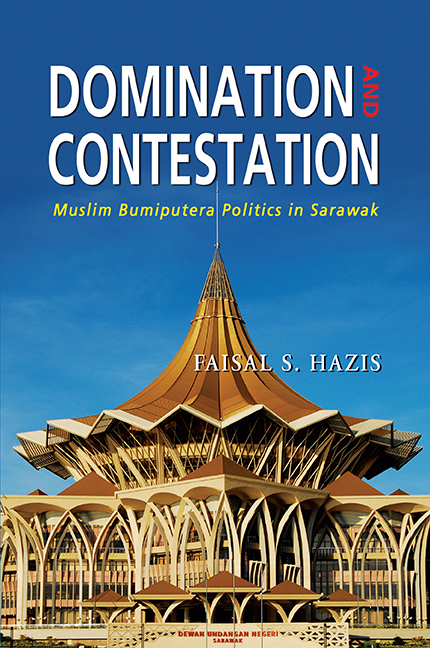Book contents
- Frontmatter
- Contents
- List of Tables
- List of Figures
- Preface
- List of Abbreviations
- 1 Introduction
- 2 State and Social Forces in Sarawak
- 3 The Resurgence of Muslim Bumiputera Politics, 1970–81
- 4 Years of Turbulence, 1981–87
- 5 Consolidation and Domination of the Muslim Bumiputera, 1987–2003
- 6 Muslim Bumiputera Politics in the Post-Mahathir Era, 2003–06
- 7 The Coastal Malays of Southwest Sarawak: A Case Study of the Muslim Bumiputera's Political Domination
- 8 Conclusion
- Postscript
- Appendices
- Bibliography
- Index
- About the Author
5 - Consolidation and Domination of the Muslim Bumiputera, 1987–2003
Published online by Cambridge University Press: 21 October 2015
- Frontmatter
- Contents
- List of Tables
- List of Figures
- Preface
- List of Abbreviations
- 1 Introduction
- 2 State and Social Forces in Sarawak
- 3 The Resurgence of Muslim Bumiputera Politics, 1970–81
- 4 Years of Turbulence, 1981–87
- 5 Consolidation and Domination of the Muslim Bumiputera, 1987–2003
- 6 Muslim Bumiputera Politics in the Post-Mahathir Era, 2003–06
- 7 The Coastal Malays of Southwest Sarawak: A Case Study of the Muslim Bumiputera's Political Domination
- 8 Conclusion
- Postscript
- Appendices
- Bibliography
- Index
- About the Author
Summary
INTRODUCTION
During Taib's first six years in office, Muslim bumiputera politics was tainted with contestation and fragmentation, leading to an unprecedented plan to topple the strongman-politician. By calling for a snap election, Taib survived the political onslaught led by his own uncle Rahman who launched a formidable challenge to his power. After the election, Taib further strengthened his position by taking several repressive and accommodative measures, aimed at consolidating the support of Sarawak's electorate, especially the Muslim bumiputera. These measures eventually strengthened Taib's position as the central state's representative in Sarawak and also the most powerful strongmanpolitician in the negeri.
Taib's amplified strength was manifested in the domination of Barisan Nasional (BN) in Sarawak elections throughout the 1990s and into the new millennium. This domination, however, was slightly tainted by the ability of DAP and Independent candidates in capturing several Chinese and Dayak seats. On the other hand, the dominance of the ruling party in the Muslim bumiputera seats was almost absolute. Although some Malay and Melanau electorate voted for the opposition, an overwhelming majority of them continued to support the ruling party, thus preventing the opposition from wrestling control not even a single Muslim bumiputera seat. This chapter, therefore, analyses Taib's ability to consolidate and dominate society in Sarawak, in particular the Muslim bumiputera, after the 1987 election. Before analysing Taib's strategies in dominating Sarawak politics, this chapter will first of all discuss developments in Sarawak politics within the corresponding period, with a special focus on the Muslim bumiputera.
THE POST-1987 CRISIS
Several significant changes were made by Taib to the negeri cabinet after winning the 1987 election. Since Daniel Tajem and his party joined the opposition, Taib decided to scrap the third Deputy Chief Minister's post which was traditionally allocated for an Iban leader from a Dayak party. Prior to the formation of Parti Bansa Dayak Sarawak (PBDS), the third Deputy Chief Minister's seat was reserved for Sarawak National Party (SNAP) but it was subsequently given to PBDS. Although Alfred Jabu from the Pesaka wing of Parti Pesaka Bumiputera Bersatu (PBB) was retained as one of the two Deputy Chief Ministers (the other one was allocated for a Chinese leader from Sarawak United People's Party (SUPP)), he was largely seen as representing PBB and not Dayak parties.
- Type
- Chapter
- Information
- Domination and ContestationMuslim Bumiputera Politics in Sarawak, pp. 152 - 205Publisher: ISEAS–Yusof Ishak InstitutePrint publication year: 2011

